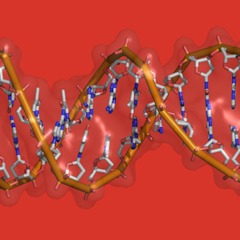
University of Washington

Founded in 1861 by a private gift of 10 acres in what is now the heart of downtown Seattle, the UW is one of the oldest public universities on the West Coast.
The UW is a multi-campus university in Seattle, Tacoma and Bothell, as well as a world-class academic medical center.
We have 16 colleges and schools and offer 1,800 undergraduate courses each quarter. We confer more than 12,000 bachelor’s, master’s, doctoral and professional degrees annually.
Links
Displaying 401 - 420 of 492 articles

A new research paper reports dangerous side effects in CRISPR-edited mice. Some scientists are pushing back, placing blame for the unwanted mutations on the experiment, not the technique.

Researchers are starting to harness the potential of this much-hyped gene editing technique – with coming applications in medicine, biology and agriculture.

In the winter of 1915, a German soldier died in a field hospital in Russia. We don’t know his name, but he helped revolutionize the way gay people have advocated for equality.

Understanding controversial suicide death estimates in Mozambique is challenging due to a lack of readily available data.

Yelp and Twitter can help us spot food poisoning outbreaks quickly. But a new study shows the data favor some communities over others.

Cats have a bad reputation as wildlife killers (deservedly so). But dogs aren’t off the hook: new research shows domestic dogs have contributed to the extinction of at least 11 species.

Eliminating malaria in Africa has been held back by a range of factors, including a lack of funds and drug and insecticide resistance challenges.

If you’ve only ever paired the idea of ‘rhetoric’ with ‘empty,’ think again. Rhetoricians of science have concrete techniques to share with researchers to help them communicate their scientific work.

To help feed a growing world population, restore biodiversity and slow climate change, a geologist calls for a moon shot effort to restore healthy soil around the world.

Oil production used to fall when prices were low. But a new drilling boom in Alaska, driven by technical advances and global partnerships, spotlights America’s rise as a world oil power.

Scientists invented chemical weapons; some are now working to destroy them. New biomolecular design techniques let researchers design proteins that can destroy nerve agents in bodies.

Brain-computer interfacing is a hot topic in the tech world, with Elon Musk’s announcement of his new Neuralink startup. Here, researchers separate what’s science from what’s currently still fiction.

Conventional wisdom says we need industrial agriculture to feed the world. Not so, says geologist David Montgomery: Practices that focus on creating healthy soil can transform agriculture.

President Trump says environmental regulation kills jobs. To fight back, conservation advocates need to show that protecting the environment can produce jobs and local benefits.

Trump cuts bait, Ryan loses his nerve – and the Obamacare repeal goes down without a vote. What’s next for Congress and the GOP?

The 2016 election made clear that the Electoral College does not weigh votes from all states equally. A new analysis suggests the power of your vote is closely linked to voter turnout in your state.

Two environmental policy experts offer a more politically palatable way to lower carbon emissions – based on consumption, not conventional regulation.

Cab drivers have long discriminated against African-Americans and other minority groups. New research suggests ride-hailing apps haven’t solved the problem.

Rising use of e-commerce is clogging city streets with delivery trucks, especially during holidays. To manage this traffic, cities need smart strategies for modernizing their urban freight systems.

The end of fossil fuels is approaching fast. But the question remains of what to do with those that remain, waiting to be sold.
